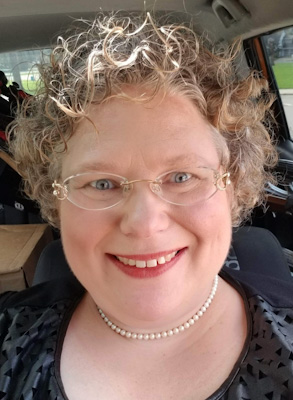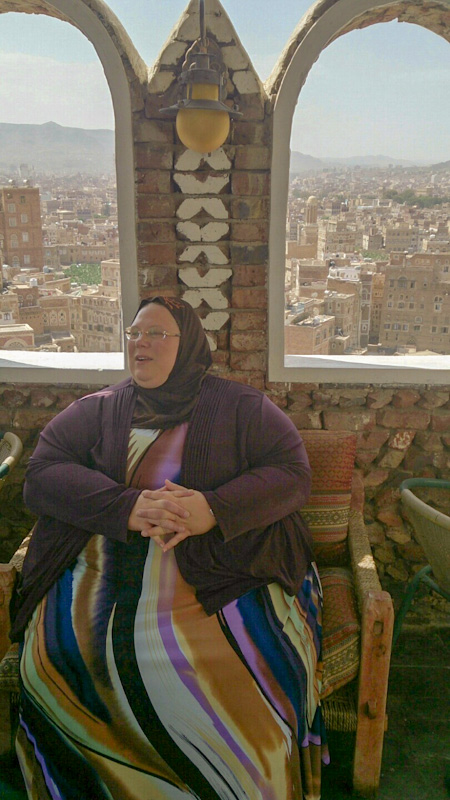Michelle Rozovics' love of learning and teaching takes her around the world

For as long as she can remember, Michelle Rozovics has tried to learn something new every day.
“I take that to an extreme, because it doesn’t mean you have to read a new case or develop a new skill,” Rozovics says. “It can be something like learn there’s a new species of whale you didn’t know exists or something just interesting to you.”
Rozovics—the managing attorney of Rozovics Law Firm in McHenry, Illinois, a small city northwest of Chicago—says it’s that curiosity that led her to the legal profession. It inspired her to pursue international and business law and to work with clients, law students and judges around the world, including in Eastern Europe and the Middle East.
Rozovics, who has epilepsy and experienced a series of accidents and illnesses that left her with limited mobility, also has spent a lot of time learning about and supporting people with all types of disabilities.
She is the vice-chair of the Illinois State Bar Association’s Civil Practice and Procedure Section and a member of its Standing Committee on Disability Law. She also leads efforts to encourage compliance with the state’s rules on remote circuit court appearances, which were amended in 2022.
Emily Masalski, a member of the ISBA Board of Governors, says Rozovics has been a tireless advocate for ensuring courts are accessible to both lawyers and litigants with disabilities.
“Michelle is fearless,” says Masalski, who also serves as an ISBA delegate to the ABA House of Delegates. “She emphasizes the need to look at the changing needs of our society while raising awareness of people facing very difficult circumstances. She is also very open about the challenges she has faced, and that has created an environment where it is okay to be open.”

Making an impact
Rozovics and her older sister were raised by their mother on the south side of Chicago. Their mother valued education, and as they were growing up, she took night classes at the local community college.
“She had this endless thirst for knowledge, and she instilled that in both my sister and me,” Rozovics says.
Rozovics also remembers wanting to educate others. Her father, who had epilepsy, died after having a seizure when she was 3. She later discovered she had epilepsy and went on medication to control her seizures when she was 12.
“It was my first experience being someone who taught others about things,” says Rozovics, who often spoke to her classmates about her disability.
She decided to become a lawyer in seventh grade, after doing a history project on Clarence Darrow and the 1925 Scopes trial. She earned her bachelor’s degree in political science in 1993 from the University of Michigan, where she also became passionate about international affairs.
While at the University of Michigan Law School, she spent one summer working for the Lawyers Committee on Nuclear Policy and doing research at the United Nations headquarters in New York. She also was a legal research and writing instructor for 1Ls before graduating in 1996.
Her experience with teaching and international law led to a job, her first after law school, with the Civic Education Project, an international nonprofit organization that assisted Central and Eastern European universities with their efforts to reform higher education in the post-Soviet era.
Rozovics spent her first year at the University of Silesia in Poland and her second year at Nizhniy Novgorod State Technical University in Russia, where she taught students about European Union law, U.S. contract law and public international law. She also coached students in the Telders International Law Moot Court Competition.
“I learned so much about the dedication that those students had to learning and to bettering themselves, and that really energized me when I came back here and started my career,” says Rozovics, who worked in private practice and as in-house counsel in the Chicago area before opening her own firm in 2006.
 Michelle Rozovics returned to teaching abroad in 2013, when she traveled to Sana’a, Yemen with the International Development Law Organization, which works to promote the rule of law in more than 90 countries.
Michelle Rozovics returned to teaching abroad in 2013, when she traveled to Sana’a, Yemen with the International Development Law Organization, which works to promote the rule of law in more than 90 countries.
‘Part of history’
Rozovics returned to teaching abroad in 2013, when she traveled to Sana’a, Yemen with the International Development Law Organization, which works to promote the rule of law in more than 90 countries.
As a visiting expert, she led two weeks of training for about 60 commercial law judges from Yemen’s trial and appellate courts. She instructed these judges on how to apply international treaties in their proceedings and conducted lessons on international business contracts and intellectual property.
Shortly before Rozovics left for her trip, the U.S. Department of State ordered all nonessential personnel out of the U.S. embassy in Sana’a due to concerns about potential terrorist attacks. She was informed about security issues, and while in the city, two armed guards escorted her to and from her training sessions.
When asked why she still decided to go, Rozovics says, “How could I not?”
“How could you not want to be a part of history?” she asks. “How could you not want to help people who are looking to make a change in their country and want to use what you can offer them? To me, it’s not a sacrifice. To me, it’s an honor.”
Rozovics, who also is a UK solicitor, has represented national and foreign companies in their business transactions. She also served as legal counsel for Core of Culture, a nonprofit organization that preserves ancient forms of dance around the world.
In one significant project, Rozovics helped negotiate cross-border contracts and other legal agreements for The Dragon’s Gift: The Sacred Arts of Bhutan, which was among the first exhibitions on Buddhist religious art that included dance. It opened at the Honolulu Academy of Arts in 2008.
“I went to Lawyers for the Creative Arts, and they wrote back and said, ‘We’re sorry, there is no one in our entire [network] that remotely could connect to this—except Michelle Rozovics,’” Joseph Houseal, the executive director of Core of Culture, says. “She was the only person they felt was qualified.”
Rozovics even traveled to Hawaii for the opening of the exhibition, which Houseal says was attended by the king of Bhutan.
“How many lawyers would go to such lengths to understand their subject?” Houseal asks.
Rozovics, who was diagnosed with lipedema in 2015 and later contracted long COVID, now uses a walker and sometimes a wheelchair to get around. While she hasn’t been able to travel in recent years, she has embraced using technology to advocate for her clients and community.
She represents more than a dozen plaintiffs who are seeking to overturn the U.S. Food and Drug Administration’s refusal to revise regulations related to how long records are retained by sperm and egg donor banks. The agency currently allows information from donors and recipients to be destroyed after at least 10 years.
Rozovics also is working with other lawyers with disabilities in Illinois to create a nonprofit organization that will provide guidance on how to reduce barriers to equal access to the courts.
“We all go through stuff, right?” Rozovics, a longtime ABA member, says. “And some days it’s rough. But as lawyers, somewhere, someday, for someone, we are going to be the most important thing that ever happened to them. And that’s enough for me.”
Members Who Inspire is an ABA Journal series profiling exceptional ABA members. If you know members who do unique and important work, you can nominate them for this series by emailing [email protected].



